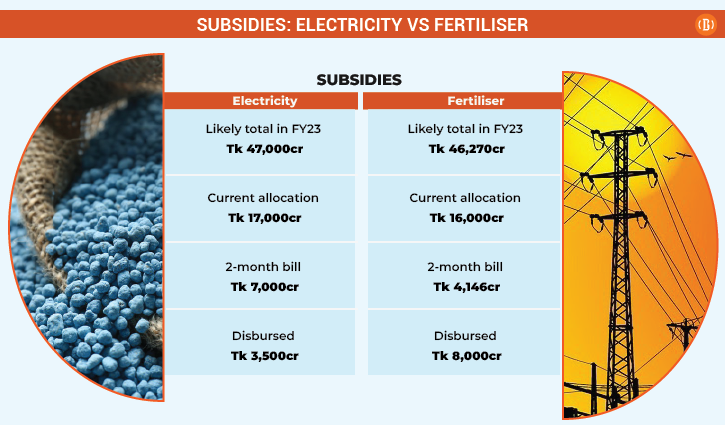Finance ministry for hiking gas, electricity prices
Asif Showkat Kallol || BusinessInsider

Graphics: Business Insider Bangladesh
Bangladesh’s electricity subsidy bill is likely to exceed Tk 47,000 crore at the end of the current fiscal year unless prices of electricity make upward adjustments to maintain financial discipline and manage the national budget, officials claimed.
Electricity subsidy outlay is also likely to supersede the subsidy basket for fertilisers this fiscal year, an official of the finance division of the ministry of finance said.
The price of imported fertilisers has tripled reaching Tk 46,270 per ton due to the global coronavirus pandemic, impact of war in Ukraine, high dollar rate and shipping charges.
Now, the Ministry of Agriculture has sent a letter to the Ministry of Finance to increase the subsidy volume for importing chemical fertiliser. For this financial year, the finance ministry had allocated Tk 16,000 crore as subsidy for fertilisers and Tk 17,000 crore for electricity.
The Ministry of Agriculture has calculated that due to the increase in prices, they will need about Tk 46, 270 crore to subsidise the country’s farming sector.
The finance division official said the two months’ electricity subsidy and capacity charges cross 7,000 crore, though the finance division paid Tk 3,500 crore subsidy in March and kept pending the subsidy of April subsidy instalment.
It is likely that the electricity subsidy bill may surpass Tk 47,000 which would then be higher than the agriculture ministry’s subsidy projection, the official added.
But two months ago, the finance division disbursed only Tk 4,146 crore for the months of January and February for farming support which has now been almost doubled.
The Bangladesh Power Development Board (PDB) sells electricity at Tk 5.09 per unit whereas it costs them nearly Tk 9 to generate a unit of electricity. The finance ministry subsidised the money, to keep the cost of electricity down and reduce the cost of living of the citizens.
BPDB proposed raising the bulk electricity price by 66 per cent on average. BERC held a public hearing on the matter on 18 May. In the hearing, Consumers Association of Bangladesh (CAB) and business representatives objected to the price hike.
“The income of the low- and fixed-income groups has not increased. Therefore, withdrawal of electricity subsidy is not supportable,” said former Bangladesh Bank governor Salehuddin Ahmed.
He noted that a substantial part of the power subsidy under the budgetary allocation had been spent on capacity payment which mainly benefitted rental power plant owners.
Finance division sources said the government has to hike the prices of gas and electricity as suggested by the recent IMF mission to get a $4.5 billion loan before February next year. This is also essential to maintain Bangladesh’s financial discipline and manage the national budget, sources argued.
Meanwhile, the fertiliser subsidy is a little less than three times the amount allocated in the budget.
According to the letter of the Ministry of Agriculture, the outlay of subsidies given as fertiliser subsidy depends on the international market price and shipping expenses.
Until the 2020-21 financial year, the price of fertiliser remained stable in the international market, which made it possible for the finance ministry to pay the bill with the subsidy money allocated to the agriculture sector in the national budget.
Finance Ministry officials said that compared to last year, the subsidy for fertilisers has been increased by Tk 4,000 crore in the proposed budget. In the budget of the last financial year, Tk 9,500 crore were allocated as fertiliser subsidy.
But due to the increase in the price of fertilisers around the world, it stood at Tk 12,000 crore at the end of the year. Due to the continued increase in prices, the amount of subsidy has been increased to Tk 16,000 crore.
The official of the finance division said that if the subsidy is given as demanded by the Ministry of Agriculture, the budgetary discipline may fall apart. “In this case, we have to think about how to reduce the subsidy.”
As a result, the Ministry of Agriculture feels that there is no opportunity to increase the price of fertiliser even if the subsidy is increased. Agriculture Minister Mohammad Abdur Razzaque said recently in an event that the price of fuel oil has increased in the world market. So, for now there is no opportunity to reduce the price of oil.
























